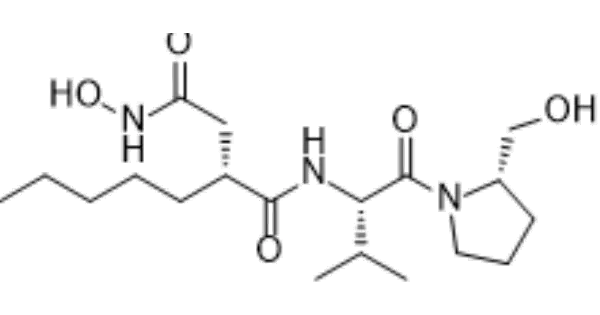Actinonin is a naturally occurring antibacterial agent with anti-tumor activity. It was first isolated from the bacterium Streptomyces antibioticus and is known for its ability to inhibit bacterial and eukaryotic metalloproteases. Metalloproteases are enzymes that require metal ions, usually zinc, for catalytic activity.
Actinonin’s antimicrobial properties make it an intriguing compound for potential therapeutic applications. It has been studied for its antibacterial activity against a wide range of microorganisms, including Gram-positive and Gram-negative bacteria. Actinonin has also been studied for its potential as an anticancer agent due to its ability to inhibit certain metalloproteases involved in tumor invasion and metastasis.
Actiononin has been shown to inhibit the essential bacterial enzyme peptide deformylase. It is a natural antibiotic that was first isolated from the actinomycete bacterium Streptomyces antibioticus. It has antibacterial properties, especially against Gram-negative bacteria. Actinonin works by inhibiting peptide deformylase (PDF), an enzyme involved in the synthesis of bacterial proteins.
In bacteria, actinonin’s primary mechanism of action involves interfering with the removal of the formyl group from the N-terminal methionine of newly synthesized proteins. This disruption eventually inhibits bacterial protein synthesis, resulting in bacterial growth inhibition.
Actinonin specifically inhibits peptide deformylase, an enzyme involved in the synthesis of bacterial proteins. Peptide deformylase is required for the removal of the formyl group from the N-terminal methionine during protein synthesis initiation in bacteria. Actinonin disrupts bacterial protein synthesis and has antibacterial activity against a variety of Gram-positive bacteria by inhibiting this enzyme.
Actinonin research has also looked into its potential applications outside of antibacterial activity. It has been studied for anti-tumor properties and potential applications in the treatment of a variety of diseases, including cancer and parasitic infections.
















